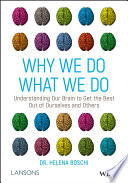

Understanding motivation is crucial to comprehending human behavior. The book delves into intrinsic and extrinsic motivations, illustrating how they influence our actions. Intrinsic motivation stems from personal satisfaction and the joy of doing something for its own sake, while extrinsic motivation involves external rewards or pressures. The author emphasizes that intrinsic motivation often leads to more sustainable and fulfilling outcomes. By exploring various psychological theories and case studies, the book reveals how motivation affects our choices in both personal and professional contexts. This understanding can help individuals align their goals and actions with their true motivations, leading to a more authentic life.
Continue readingOur environment plays a pivotal role in shaping our behaviors and decisions. The book discusses how social, physical, and cultural environments can either foster or hinder our motivations. It highlights the importance of creating supportive environments that encourage positive behaviors and discourage negative ones. For instance, workplaces that promote collaboration and creativity often yield better results than those that foster competition and isolation. The author provides practical strategies for individuals and organizations to design environments that nurture motivation and enhance productivity, underscoring the idea that our surroundings are not just backdrops but active participants in our lives.
Continue readingHabits are powerful drivers of behavior, often operating below our conscious awareness. The book explores the science behind habit formation and change, explaining how habits are formed through a cue-routine-reward loop. It discusses the importance of recognizing and understanding our habits to make meaningful changes in our lives. By providing insights into how to effectively break bad habits and cultivate good ones, the author empowers readers to take control of their behaviors. The book also discusses the role of willpower and self-control in habit formation, offering practical tips for strengthening these traits to achieve long-term goals.
Continue readingHuman beings are inherently social creatures, and our connections with others significantly influence our motivations and behaviors. The book examines the role of social relationships in shaping our identity, self-esteem, and overall well-being. It highlights the importance of building strong, supportive networks that foster motivation and resilience. The author discusses how social comparison can affect our self-perception and drive us to achieve more or, conversely, lead to feelings of inadequacy. By emphasizing the value of community and collaboration, the book encourages readers to invest in their relationships and recognize the power of collective motivation.
Continue readingHaving a clear sense of purpose is a fundamental driver of motivation. The book discusses how purpose can provide direction and meaning to our lives, helping us navigate challenges and stay focused on our goals. It explores the difference between goals and purpose, emphasizing that while goals are often specific and measurable, purpose is broader and more enduring. The author provides examples of individuals and organizations that have successfully aligned their actions with a clear purpose, leading to greater satisfaction and success. This idea encourages readers to reflect on their own values and aspirations, fostering a deeper understanding of what truly motivates them.
Continue readingFeedback is a critical component of motivation and personal growth. The book explores how constructive feedback can enhance performance, foster learning, and reinforce positive behaviors. It discusses the different types of feedback—positive, negative, and constructive—and their varying impacts on motivation. The author emphasizes the importance of creating a culture that values feedback, where individuals feel safe to give and receive it. By learning how to effectively provide and utilize feedback, readers can enhance their personal and professional relationships, leading to improved outcomes and greater motivation.
Continue readingEmotions and cognition are deeply interconnected, influencing our motivations and decisions. The book discusses how emotional states can affect our thinking processes and vice versa. It highlights the importance of emotional intelligence in understanding ourselves and others, enabling us to navigate social situations and make informed decisions. The author provides strategies for developing emotional awareness and regulation, empowering readers to harness their emotions as tools for motivation rather than obstacles. This idea underscores the complexity of human behavior and the need for a holistic approach to understanding motivation.
Continue readingThe reading time for Why We Do What We Do depends on the reader's pace. However, this concise book summary covers the 7 key ideas from Why We Do What We Do, allowing you to quickly understand the main concepts, insights, and practical applications in around 22 min.
Why We Do What We Do is definitely worth reading. The book covers essential topics including The Role of Motivation, The Influence of Environment, The Power of Habits, providing practical insights and actionable advice. Whether you read the full book or our concise summary, Why We Do What We Do delivers valuable knowledge that can help you improve your understanding and apply these concepts in your personal or professional life.
Why We Do What We Do was written by Dr Helena Boschi.
If you enjoyed Why We Do What We Do by Dr Helena Boschi and want to explore similar topics or deepen your understanding, we highly recommend these related book summaries:
These books cover related themes, complementary concepts, and will help you build upon the knowledge gained from Why We Do What We Do. Each of these summaries provides concise insights that can further enhance your understanding and practical application of the ideas presented in Why We Do What We Do.